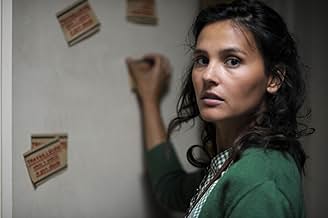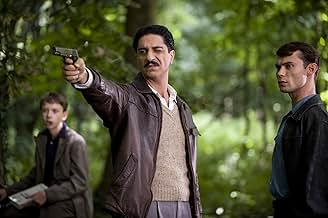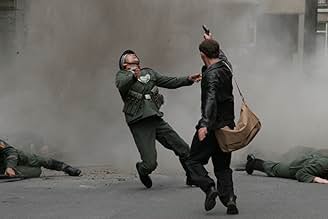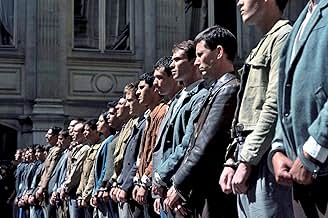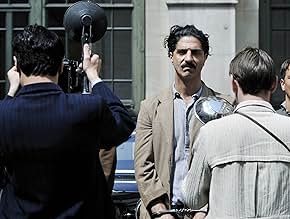Agrega una trama en tu idiomaThe poet Missak Manouchian leads a mixed bag of youngsters and immigrants in a clandestine battle against the Nazi occupation. Twenty-two men and one woman fighting for an ideal and for free... Leer todoThe poet Missak Manouchian leads a mixed bag of youngsters and immigrants in a clandestine battle against the Nazi occupation. Twenty-two men and one woman fighting for an ideal and for freedom. News of their daring attacks, including the assassination of an SS general, eventuall... Leer todoThe poet Missak Manouchian leads a mixed bag of youngsters and immigrants in a clandestine battle against the Nazi occupation. Twenty-two men and one woman fighting for an ideal and for freedom. News of their daring attacks, including the assassination of an SS general, eventually reaches Berlin.
- Premios
- 4 premios ganados y 1 nominación en total
Argumento
¿Sabías que…?
- TriviaCharacters Micha Aznavourian (Serge Avedikian) and Knar Aznavourian (Christina Galstian) were, in real life, the parents of singer and actor Charles Aznavour. Whilst Charles does not feature, as a character, in the film, he is briefly mentioned by his parents (as characters), around 42' 55" into the movie, as having early success as a child singer.
- ErroresWhen showed up to the press after being arrested in November 1943, a member of the group tells a policeman the FFI will avenge them when they come. The FFI (Forces Francaises de l'Interieur) was regrouping several resistance groups and was created in 1944.
- ConexionesReferenced in The Tonight Show Starring Jimmy Fallon: Adam Sandler/Judd Apatow (2015)
- Bandas sonorasString Quartet No.17 in B-flat major K. 458
Written by Wolfgang Amadeus Mozart (as Mozart)
Sung by Delphine Bardin, Laurent-Benoit Ostyn, Jean-Claude Tchevrekdjian (Claude Tcheurekdjian), Vincent Dormieu, Olivier Perrin
Enregistrés par Simon Derasse
Without wanting to get into a petty discussion on whether The Army of Crime is better than 2009's other World War Two resistance-style thriller Inglourious Basterds, let it be known that as Tarantino's recent outing dealt with similar overall subject material; his characters were, certainly in the case of the heroine, running on a distinct character arc of revenge as those at the centre of all of it adopted roles equal to cartoon characters. The maiming and gratuity these people known as the Basterds were capable of was thrust unto us very early on as these gutsy; no-nonsense; Southern-drawl spouting sadists out to beat; kill; pillage and scalp as many Germans as they can find made itself apparent. Whilst it all sounds like a lot of fun, Army of Crime presents its leads, indeed some of whom are as young as the Basterds and as seemingly angry as the Basterds, but does so in a more natural and realistic light. Observing Robinson Stévenin's character named Marcel, here, as he transforms from a petulant youth whom has a girlfriend and whose hobbies include swimming into a creepy and unnerving individual, is more rewarding than having comic book creations already established to be of that ilk bully and push their way through specific obstacles.
But Guédiguian does his best to refrain from giving us a character to obviously align ourselves with, indeed resisting the use of a specific protagonist. Instead, he spreads around the plight of these people pretty evenly: men; women; French-born individuals; Armenian immigrants; youngsters and elder people, there is no prejudice towards one 'type' of person being braver or more heroic or getting more of a study. For some, this technique will feel sporadic; making the film come across a weighty and quite heavy piece without an individual to truly latch onto resulting in some audiences being turned off. Heading in, I had no knowledge of the true story element to proceedings; but it would go a long way in describing the natural sense Guédiguian gets across. Not knowing how everything turned out and not knowing what became of most involved is, I think, a pleasure amongst many to be had out of The Army of Crime.
The film's documenting of violence and how violence and the hatred of an occupying force in the Nazi soldiers can combine in propelling people to psychological places they might well have been unsure previously existed within themselves, is an interesting side-dish for The Army of Crime. Some characters slip into a brutal, hate-filled stupor easier than others; blasting their way through codes of morality in a rage of fury like nobody's business. For others, that transition is more difficult but not necessarily impossible. In the case study of young Frenchman Thomas Elek (Leprince-Ringuet), much is set up that his temperamental attitudes and short fuse exists and can rather easily get him into trouble. After being berated with an anti-Semitic remark by a fellow class-mate, he sits in the principal's office and is forced into hearing his highly attractive prospects for the future in front of him laid out, the light dim enough to have half his face covered by pitch darkness, the other half in brilliant light. The combination of the authoritarian individual speaking of the future and later roles the young man may very well adopt combined with that steely expression complete with use of lighting suggests a link to more than one possible future.
But Thomas is not as much-a live wire as the aforementioned Marcel, a rag-tag; leather jacket sporting; rough and ready looking young man whom gets highly agitated early on at a tailors over seemingly nothing. He hates the Germans; loves his swimming and maintains an odd, semi-aggressive relationship with girlfriend Monique (Naymark). There seems to be an initial element of seemingly harmless shenanigans behind the first time Marcel engages in illegal activity of a resistance sort, when hundreds of red pages are dropped from a two storey building encouraging rebellious behaviour against the Germans. But this occurrence plays a more important role in highlighting Marcel's advances through the film, in the process taking everything far more seriously and when the snatching of his father by the German's occurs, moves his plight into a more personal realm.
One individual, a middle aged man named Missak played by Simon Abkarian, is someone with prior experience of conflict between nations; he swears he will not kill anyone whilst involved in the resistance, and the pain on his face is agonising early on when he confesses to having to leave behind his fellow inmates at a local German built prison housing other arrested intellectuals, even if it meant saving his own life. The praise that he receives later on when a particular act of bravery, although essentially rendered heroism by those within the circles given the scenario, does further stoking to his morally torn core. Director Guédiguian even finds room to encompass that old 'two sides of the same coin' routine when, around a table (during which these exchanges usually happen), factions within the group demand different things out of the entire process; degrees of antagonism lead by a female character who wants her voice heard. The film is a rewarding exercise in both character study and slow burning drama.
- johnnyboyz
- 24 mar 2010
- Enlace permanente
Selecciones populares
- How long is Army of Crime?Con tecnología de Alexa
Detalles
- Fecha de lanzamiento
- País de origen
- Sitio oficial
- Idiomas
- También se conoce como
- Army of Crime
- Locaciones de filmación
- Productoras
- Ver más créditos de la compañía en IMDbPro
Taquilla
- Total en EE. UU. y Canadá
- USD 37,031
- Fin de semana de estreno en EE. UU. y Canadá
- USD 8,102
- 22 ago 2010
- Total a nivel mundial
- USD 1,199,877
- Tiempo de ejecución2 horas 19 minutos
- Color
- Mezcla de sonido
- Relación de aspecto
- 1.85 : 1
Contribuir a esta página



